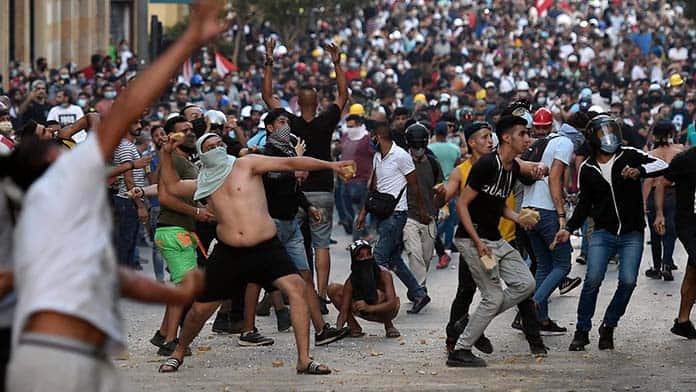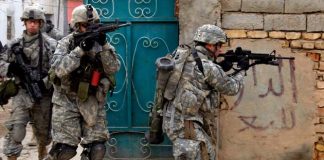“We have been fighting the system for a long time, now our anger has overflowed, it has gone beyond everything normal because the explosion at the harbour means we have to change everything.
“On Saturday we occupied the foreign ministry, the economy ministry, the energy ministry and the Association of Banks. The banking place we set on fire.
“Some of our revolutionaries brought a large crane to take apart a barricade set up to defend parliament.”
Those are the words of Rasha in Beirut, Lebanon. He is one of the many thousands of protesters who defied tear gas, mass arrests and beatings to demand the fall of the government and the political system.
Their protests followed a shattering explosion in the city’s port area that killed over 150 people.
Around 2750 tons of highly explosive ammonium nitrate had been stored in the port for more than six years. Lebanese customs officials wrote letters to the courts at least six times from 2014 to 2017, seeking guidance on how to dispose of the material. But no action was taken.
As recently as six months ago, officials inspecting the consignment warned that if it were not moved it would “blow up all of Beirut”.
And on Tuesday 4 August it ignited.
“The explosion is really a massacre,” Rasha said. “It cannot be said to be an accident.
“It is a symbol, and a result, of the corruption of the people in the government, and of a political regime that works for the powerful but not the poor.
The protests took place across large areas of the city centre, with people hurling down security force barricades and chanting “Revolution! Revolution!”
Hundreds of people took over the foreign ministry building for several hours. They hung red banners with a raised fist from the building, which had been damaged in the blast, and proclaimed Beirut a “disarmed” city.
Thousands of people assembled in the central Martyrs’ Square. They erected gallows and conducted ceremonial hangings of effigies of politicians including president Michel Aoun, Nabih Berri, the speaker of parliament and Hezbollah leader Hasan Nasrallah.
“Murdered, not martyred,” read one sign held by a demonstrator. “Leave, you garbage,” said another.
Dignity
The New York Times newspaper reported, “The protesters chanted ‘the people want the fall of the regime,’ and held posters saying ‘leave, you are all killer’. ‘We want a future with dignity, we don’t want the blood of the victims of the explosion wasted,’ said Rose Sirour, one of the demonstrators.
“No one in the streets set any store by government promises to hold those responsible to account.”
Lebanon was already in crisis before the blast.
The economy is in freefall, banks have refused to give depositors access to their money, and unemployment and inflation have soared.
The number of coronavirus cases reported daily was accelerating and many parts of the country were suffering from lengthy power cuts.
“Revolution” was the slogan of last October’s protests in Lebanon that demanded an end to inequality, corruption and the sectarian political system.
The slogans on Beirut’s streets now are similar to the ones that rang across the Middle East almost a decade ago and saw the fall of regimes in Tunisia and Egypt.
The scale of the protests now has forced Prime Minister Hassan Diab to say he will hold early elections.
Diab said he would introduce a law calling for early elections and said he would remain in government for two months until major parties can reach an agreement.
The entire government resigned.
But for many protesters that is not enough. “We do not want just some changing of chairs among the big ones as they are called,” says Rasha. “These criminals blew up our homes and took away our hopes.”
Sami Atallah, director of the Lebanese Center for Policy Studies, said, “This clientelistic and sectarian system breeds corruption and incompetence,” adding that Lebanon’s old guard was “trying to throw the blame on this government and let it take the fall so they distract the blame from them or their cronies”.
Politicians who have appeared in public, including former prime minister Saad Hariri, have been attacked. Angry demonstrators told Hariri, “Don’t you even think of returning to power.”
Justice Minister Marie-Claude Najm was followed through the streets of Beirut’s Gemmayzeh neighbourhood. Protesters threw water bottles at the minister.
Protesters are also angry at the police and army for their brutal treatment of those taking to the streets.
“The crisis in Lebanon is so deep that only change from top to bottom has a chance of saving us,” says Rasha.





